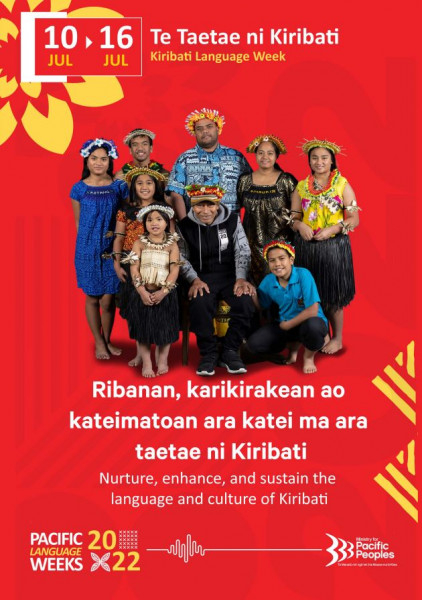Past impacts the future of te taetae ni Kiribati
Past impacts the future of te taetae ni Kiribati

(Picture caption: Get involved in Kiribati Language Week - Wikin te Taetae ni Kiribati 2022. Visit the
MPP website for more information and language resources.)
Kiribati is currently in the grip of a disastrous drought, while it deals with the impact of climate change.
Minister for Pacific Peoples Hon Aupito William Sio says it makes Kiribati Language Week 2022 a particularly special time to think about the future.
The third of nine Pacific Language Weeks, Wikin te Taetae ni Kiribati began yesterday (July 10), focused on the theme, ribanan, karikirakean ao kateimatoan ara katei ma ara taetae ni Kiribati.
This translates into English as, nurture, enhance and sustain the Kiribati language and culture.
Given the current crisis this theme sums up how the 3,225-strong Kiribati people who call Aotearoa home feel, Minister Sio adds.
“It also aligns with the Pacific Language Weeks overarching theme of sustainability in what is the first year of the UNESCO Decade of Indigenous Languages.
“UNESCO says at least 40 percent of the 7,000 languages used worldwide are in danger of being lost.
“The people of Kiribati who live in Aotearoa say they will embrace the future by utilising modern technology to promote, nurture and preserve their language so their past can continue to flourish.
“Kiribati wants to move with the times without losing the traditional way.”
Four groups, Kiribati Federation Association, New Zealand Kiribati National Council, Wellington Kiribati Club and Waipounamu Southland, have been working collectively on a steering committee to prepare content for the language week, which consists of a mix of online and in-person activities and events, including the Kiribati Independence Day commemorations on July 12.
Minister Sio says data from our Pacific Language Strategy states 50 percent of the i-Kiribati in Aotearoa speak the language, 24 percent under the age of 15 speak the language and 20 percent of New Zealand-born Kiribati can speak the language, with 41 percent of i-Kiribati people born in New Zealand.
“Kiribati is one of the only small Pacific groups which currently has the option of attending a bilingual education unit in Auckland which was established in 2019.
“We urge you to celebrate this unique language with us – at work, school, church, playing sport or in the home – kam bati n rabwa.”
Visit the MPP website for more information and language resources.
